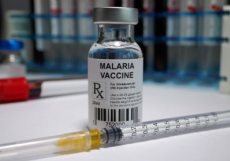

Introduction of the malarial vaccine to fight one of the deadliest diseases
“This is a day to celebrate as we begin to learn more about what this tool can do to change the trajectory of malaria through childhood vaccination.”- Dr Matshidiso Moeti.
Malaria, I am sure we are all familiar with it and for years have been told we cannot be vaccinated against it, but recent advances have led to a bigger opportunity for prevention. But let’s begin with what malaria actually is. Malaria is caused by the parasite Plasmodium which is carried by female Anopheles mosquitos. There are various sub species of the parasite, the most deadly to humans is Plasmodium falciparum and Plasmodium vivax. The life cycle of Plasmodium is rather complex but the three basic stages are mosquito stage, human liver stage and human erythrocytic (blood) stage. Symptoms usually consist of fever, nausea, vomiting, abdominal pain, diarrhea, tiredness and headaches. Or ever worse, yellow skin, seizures, coma and death. Following being bitten, it takes approximately 15 days to experience any symptoms. Treatment is effective when treated correctly, if not then recurrent infection is a problem. The current treatment is antimalarials.
Prevention ranges from mosquito control to medication. So why was a vaccine so difficult? Plasmodium have the ability to produce a variety of var genes making them immunologically distinct. Changing expression of these genes enables the parasite to avoid the immune system allowing them to thrive in the human body. Currently, UK citizens are advised to take antimalarial medication like chloroquine and malarone when travelling to malarial zones. Prevention is seen as more cost effective than treatment.
“We have seen tremendous gains from bed nets and other measures to control malaria in the last 15 years, but progress has stalled and even reversed in some areas. We need new solutions to get the malaria response back on track, and this vaccine gives us a promising tool to get there,” – WHO Director-General Dr Tedros Adhanom Ghebreyesus.
The government of Malawi launches the world’s first malaria vaccine RTS,S. The vaccine has been developed by PATH and GSK to create a recombinant vaccine. it is the first vaccine to demonstrate a significant reduce in cases of malaria in children. Clinical trials showed prevention of 4 out of 10 cases and 3 out of 10 severe malarial cases. Children are at the highest risk of death and are the poorest children are the ones to suffer the most. Malaria holds the biggest threat to poor African communities. The vaccine is to be used alongside pre-existing control methods.
The malaria pilot program has the aim of reaching 360,000 children each year across three countries; Malawi, Ghana and Kenya. The programme has received a large amount of financial support, with investors such as Gavi, the Global Fund to Fight AIDS, Tuberculosis and Malaria and Unitaid. With additional contributions from WHO,PATH and GSK.
With remarkable success and innovative ideas, the research for malarial vaccines still continues as the battle for fighting against resistant strains is not yet won.
Image- https://www.the-scientist.com/news-opinion/distribution-of-worlds-first-malaria-vaccine-begins-65777

0 Comment:
Be the first one to comment on this article.